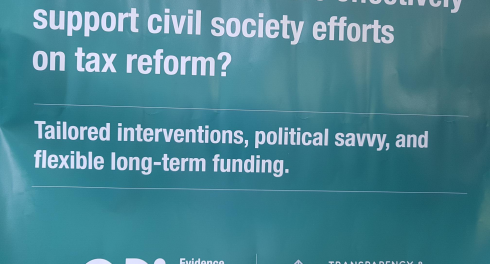In case you missed it…
This past week saw releases for core indices used to track progress in the transparency and accountability field. Sadly, none make for encouraging reading.
Starting big picture, more than half the countries in the latest update of a democratic-health index saw their scores decline, while the 2018 Edelman Trust Barometer reveals that even trust is polarized – while the US saw trust fall for all institutions, people in China reported the greatest increase in trust overall.
Zooming in on public finance, many governments are now providing less information about the use of public funds, according to the latest Open Budget Survey. Sub-Saharan Africa suffers the most dramatic decline. Meanwhile, the survey ranked the Philippines as the most transparent in Asia. G-watch took a closer look at the results and concluded that it is not as good as it seems. Alan Hudson of Global Integrity offers his insights on why backsliding on open budgets occur – that risk of backsliding is associated with the use of and demand for budget data. More positively, a new case reminds us of the value of multi-level advocacy to help follow the money in Ghana, building on the experiences of TAI member grantees.
While not showing active backsliding, Tax Justice Network’s Financial Secrecy Index reveals “slow progress” in improving performance on financial secrecy. Who’s the most secret of them all? Well, no surprise that Switzerland retains top spot, but some may not have expected the US to be hot on their heels. How did the US become to be a top secrecy jurisdiction? Richard Philipps explains.
Meanwhile, the EU has removed eight countries from its tax haven blacklist including Panama – leaving just 9. Fair tax campaigners were not amused. They already lamented the omission of various British overseas territories from the list and worry now about what real commitments have been made to justify delisting countries. On one positive note, mainstream UK media did pick up on the authorization of unexplained wealth orders, which require individuals suspected of serious crime of involvement in bribery or corruption to explain the source of any property valued over 50,000 pounds. It seems no surprise that this step follows the BBC’s ongoing McMafia tv drama that highlights the use of UK properties by criminal networks.
Talking of tv and its influence, TAI members were excited to be in Abuja last week and meet some of the newest Integrity Idols. The model draws on appeals, particularly to young people, to celebrate integrity and resist corruption. The approach is likely to be applauded by pollsters for the 2017 Global Corruption Barometer who confirm that while youth are among those most affected by corruption, they also have great potential to resist through social media.
Politicians might wish to take note, particularly as Thomas and Christopher Carothers argue that fighting corruption may be a smart tactic to achieve political stability. Anti-government protests in Peru and elsewhere underline what they argue is a new reality of global politics – exposure of government corruption and public anger have become the top reason for bringing down political leaders around the world. The improved access to information (e.g. Panama papers) fueled rising citizen expectations for greater governmental accountability.
“Publishing with purpose” is how the Open Data Charter aims to move forward in 2018. Ania Calderon explains, “rather than advocating for governments to open up as much data as possible, as fast as possible, the Charter network will develop practical guidance for government reforms to open up datasets in ways that are most likely to yield specific and tangible benefits to citizens.” The US may wish to pay attention – judging by the open data state of the union release. No, you didn’t miss Mr. Trump extolling open data – this is the report of Data Foundation and Grant Thornton, based on interviews with government and industry leaders. They argue open data will only reach its potential through the combination of government, compliance, and private sector uses (see matrix below).

Source: Data Foundation
What would it take for organizations to be truly data-driven? Cultural change, according to the UNHCR, highlighting the need for diversity within the organization for use and analysis of data. This resonates with Tim Davies’ take on what’s next for open contracting in the UK. According to the author, local implementation should be the investment in 2018 – “monitoring and motivating each department or public agency to be sure they are not only seeing transparency in procurement as a tick-box compliance exercise, but instead making sure it is embraced as a core part of accountable and open government”. The Philippines government may be heading the opposite direction as it moves to replace public bidding for contracts with the “Swiss challenge,” which – you guessed it – is less transparent.
We talked a lot about struggles with both the FOIA system and proactive disclosure in Nigeria this past week, so are interested to read Beth Noveck’s take on how to take advantage of combinations of open data’s collaborative and innovation-centric approach and the adversarial and monitorial tactics of freedom of information regimes. Seeking lighter fare? We stumbled upon this compilation of hilarious and creative ways of using data from FOIA requests in the US. Meanwhile, Mya Frazier investigates how tech giants Facebook and Amazon are skirting FOIA processes by not revealing their identities in public deals as well as controlling the release of information.
In the context of data privacy week, the Privacy International team made the case for retaking control of our data, while Susan Crawford warned of big tech’s intentions. Cities need a sense of data governance risks when dealing with big tech companies. Even your workout could expose you – Strava’s global heat map demonstrates how Fitbit users become part of a collective global mapping and raises questions about data privacy and consent. How to reclaim the online space? A couple of visionaries have been working on a decentralized internet that is claimed to be safe, hack-free and leaves no data trails for big online companies to harvest.
Sadly, authoritarianism is going digital in the meantime. Azerbaijan authorities are blocking websites on grounds of national security while elections loom. In the Philippines, the license of online news platform Rappler, critical of the Duterte government, has been revoked over “ownership” by TAI member Omidyar Network. In Kenya, authorities have shut down four tv broadcasting stations. The online crackdown on media and civil society, as well as misinformation and disinformation, prompt the need for philanthropy and media to come together and combat cyber-politics and defend democracy. Meanwhile, ICIJ recommends five digital security tools that could protect journalists, their work and sources from digital attacks.
Finally, we are excited to help share new strategies of our members – thematic and country-specific – see TAI spotlight below.
TAI spotlight
- Evolving Context, New Strategy for the Fiscal Governance Team | Open Society Foundations – Julie McCarthy lays out their analysis of the shifting context and resulting evolution in their thinking reflected in a new strategy. Check out this two-part blog series.
- Omidyar Network Expands Support for UK-focused Governance and Citizen Engagement Initiatives | Omidyar Network – Andrew Clarke shares Omidyar Network’s approach to effective governance and citizen engagement in response to the EU referendum and the ongoing devolution process. Check out ON’s investments in the UK for independent media and enhancing community and democratic participation through campaigning skills building.
- DFID’s Priorities 2018 | DFID – DFID’s new head Penny Mordaunt and Permanent Secretary Matthew Rycroft discuss UK aid spending for 2018
- [New Blog] Data for Accountability and Impact: A Very Large Gap – Has the open data agenda delivered in terms of promoting accountability and impact? Fabrizio Scrollini of ILDA explains the large gap. The Spanish version is also available.

Of potential interest…
- YouTube Takes Aim at Conspiracies, Propaganda – Tech giant aims to label videos from state-funded broadcasters to fight misinformation
- Saudi anti-corruption drive generates $106bn in settlements – Anti-corruption drive by Crown Prince Mohammed bin Salman proves lucrative, money to be used to aid citizens cope with high cost of living
- The Open Governance Research eXchange is about to hit a 1000 papers – Check out OGRX, the first and only platform of curated resources on opening governance
- European Commission launches the EU Blockchain Observatory and Forum – EU promotes blockchain technologies to governments, private sector and citizens
- To Improve Open Data, Help Publishers – ODI releases register of open data publishing tools

- 7th Innovation Fund Open Call: Shift the Story – February 9
- Gender Data Impact: Call for Stories – March 8
- Join the OGP Local Program: Call for Expressions of Interest – March 9
- ICFJ Knight Fellow, Data Journalism, Central/Eastern Europe

- Blockchain for International Development (online course) – January 22 -February 16
- On Think Tanks Conference – Feb 13-18 (London, UK)
- Staying Connected (with grantees and their beneficiaries)- February 13, 2018 (webinar)
- Taxation and SDGs – First Global Conference of the Platform for Collaboration on Tax – Feb 14-16 (New York)
- Data on Purpose: The Promise and Pitfalls of the Connected World – February 15-16 (Stanford, CA)
- Conference on Fairness, Accountability and Transparency (in tech systems)– February 23-24 (New York, USA)
- Open Data Day 2018 – March 3 (Global)
- Innovations in Participatory Democracy Conference – March 8-10 (Phoenix, Arizona, USA)
- Toward Greater Impact: Building Stronger Funder-Nonprofit Relationships – March 20 (California, USA)
- Collective Impact Convening– April 3-5, 2018 (Austin, TX)
- A Return to ‘Governance in Dark Times’? Creating Spaces for Citizen Dialogue, Encouraging Engagement in Public Life, and Ensuring Government Transparency and Accountability – April 12-14 (Orlando, Florida, USA)
- TicTec 2018: The Impacts of Civic Technology Conference– April 18-19 (Lisbon, Portugal)
- Grantmakers for Effective Organizations National Conference – April 30 – May 2, 2018 (San Francisco, CA)
- RightsCon (human rights in the digital age) – May 16 – 18 (Toronto, Canada)
- OGP Global Summit 2018 – July 17- July 19 (Tbilisi, Georgia)
- The Future is Open: 5th International Open Data Conference – September 20-21, Buenos Aires
- International Anti-Corruption Conference – October 22-24 (Copenhagen)


